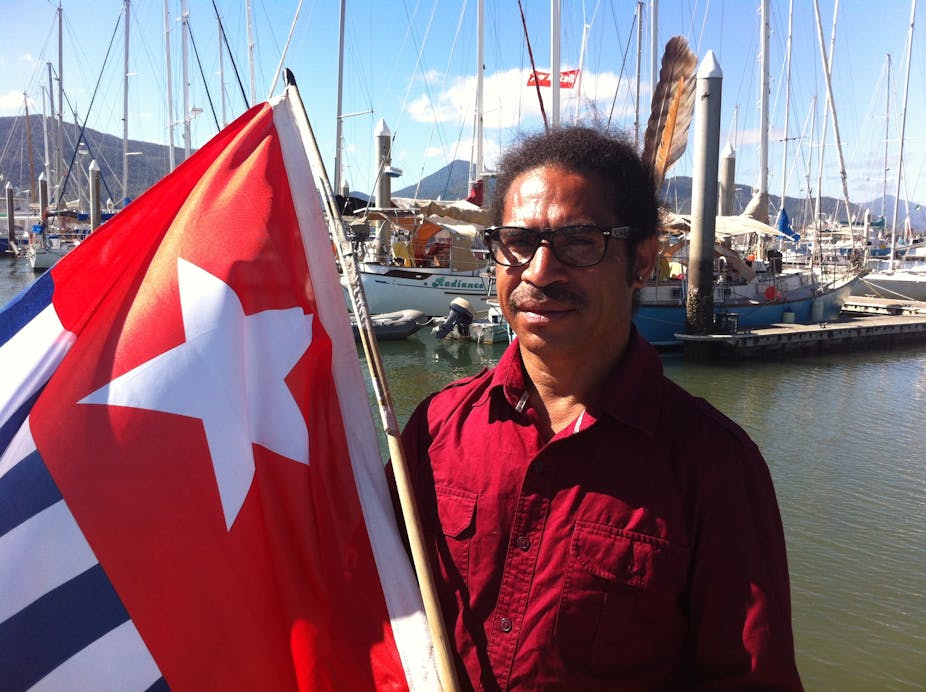Given the extreme sensitivity with which the issue of West Papua is viewed in Indonesia, the “Freedom Flotilla” heading from Australia to the Indonesian-controlled territory is sure to create tension.
The question now is how much tension and how it will be handled by all involved.
West Papua refers to the western half of the island of New Guinea that has been under Indonesian rule since 1962. Indigenous Melanesians living there have continued to call for self-determination. Recently, Australian Aboriginal political activists have entered the fray. One result of this is the Freedom Flotilla, which is aimed at bringing this issue into the mainstream.
The Aboriginal link is important. The genesis of the Freedom Flotilla was in the Aboriginal Tent embassy in Canberra in 2000, when the newly-arrived West Papuan exile Jacob Rumbiak met with Aboriginal elder “Uncle” Kevin Buzzacott and explained the dilemma facing the West Papuans.
This struck a chord with Buzzacott. It resonated with the long history of Aboriginal occupation, dispossession and marginalisation. Buzzacott saw the connection as deeper than shared victimhood. He traced their ancient historical and cultural relationship back to prehistoric times with its common past and ancestry.
The Freedom Flotilla started in Blanche Springs, adjacent to Lake Eyre in Australia’s arid heart. Carrying water from this spring and ashes from the Tent Embassy fireplace, the quest came to symbolise a re-connection of these two ancient peoples. The group travelled from the desert to Cairns and boarded the flotilla for the final leg to Merauke on Papua’s southern coast. Two of the vessels subsequently broke down, leaving only the flotilla’s flagship vessel, The Pog.
Flotilla members were issued with Aboriginal passports and given entry visas by Rumbiak in his self-proclaimed capacity as “Foreign Minister” of the “Federated Republic of West Papua”.
Flotilla spokesman Ruben Blake says the flotilla hopes to draw attention to the situation in West Papua and pave the way for journalists and independent observers to have greater access. Pointedly, the flotilla also hopes to highlight Australia’s silence on West Papua and its complicity through its funding of the Indonesian military.
But no-one knows how this will end. The Indonesian government has signalled its intention to stop the flotilla from landing in West Papua and its armed forces have been told to intercept the vessel. The best outcome would be if the boat is peacefully “turned around” - but other, less benign, outcomes are also possible. The worst would be the use of armed force by the Indonesians, which seems unlikely but given the the military’s violent reputation, it is not impossible.
Another scenario involves The Pog being impounded and the crew arrested, if for no other reason than travelling without valid passports and visas. This could mean a long spell in jail and loss of the vessel.
The possibility also remains for a major diplomatic incident.
Former Australian foreign minister Bob Carr has withdrawn diplomatic support for people who intentionally break other country’s laws. He also dismissed flotilla members as being engaged in a “cruel hoax” in promoting the “impossible” dream of an independent West Papua. But this will not put the story back in the can.
Incoming Australian foreign minister Julie Bishop will be left to deal with seething anger felt in Jakarta at what it sees as a direct threat to their sovereignty coming from Australia shores. After Australia’s involvement in East Timor’s liberation, distrust and suspicion of Australian motives remains high. The possibility of a freeze in bilateral relations, as occurred in 2006 over Australia accepting West Papuan refugees, persists.
Given all the areas in which Australia and Indonesia must engage, such as on asylum seeker policy, this relationship is of first order importance for both countries. But whichever way this episode ends, the Freedom Flotilla has highlighted one of the most fraught issues between Australia and Indonesia.
Also seeping into the collective consciousness is the notion that West Papua is the “new” East Timor. Increased militarisation, massive resource development and a huge influx of non-Melanesian Indonesian migrants has intensified the situation.
This bodes badly for the bilateral relationship.
If Australia’s future relations with Indonesia hang on the thread of West Papua - as the diplomatic frenzy created by six people on a leaking boat seems to imply - much more attention must be devoted to the grievances of the West Papuan people. This has now become a matter of regional security.

